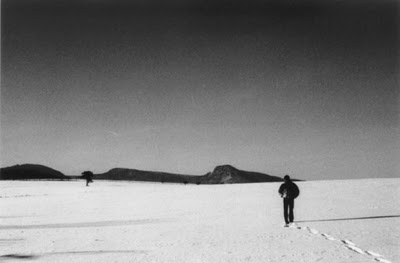I love true adventure stories. I can't tell you exactly why, but at the very least, they help me resist becoming complacent with living a risk-free life. Another reason is that these stories typically tell me something about how courageous people are wired…how they think, feel, interact..and most importantly, how they respond to inevitable setbacks, disappointments and fears.
These stories also attract the scientific eye of research psychologists, who are interested in what happens to the human mind and human relationships under such extreme conditions. I've posted several articles based on real life stories of adventure, with all the trials and tribulations that go along with the experiences. I believe these stories offer insight for us all into ourselves, our organizations, and most importantly, how we can successfully navigate difficult times. In a post written by Christian Jerrett for BPS Digest, I found a fascinating story that illustrates some great principles we can all learn from. I trust that you will thoroughly enjoy the research findings below…and in the next edition, I will follow up with my own insight regarding how all of this applies to you and your team.
"A new paper by Gloria Leon and her colleagues has gauged the psychological profile and experiences of two polar explorers – given the pseudonyms Bill (age 32) and Andrew (age 35) – who in 2009 became the first team from the USA to reach the North Pole without outside support. Starting out from Ward Hut Island in Canada, they reached their target in 55 days. Personality profiles of the men prior to the challenge were largely as you might expect – they were both high-scorers in leadership and extraversion and low scorers on harm-avoidance. Andrew also scored low in conscientiousness, which may be unexpected given the preparation required for an expedition, and had a tendency to become highly engrossed in his own thoughts and surroundings.
The challenge itself was grueling, with each man hauling a 300 pound sled. Temperatures ranged from minus 60 degrees Fahrenheit at the start to zero degrees Fahrenheit at the end. Both men lost significant amounts of weight. At one point, Bill fell through ice and was submerged up to his neck, only narrowly escaping hypothermia. The final leg of the trip was the most arduous as the duo fought to reach their destination before their helicopter arrived on Day 56 (it was to pick them up whether they'd reached their target or not). For the last 66 hours, the pair had just one hour of sleep for every 16 hours on the move. Throughout, the men filled out weekly questionnaires about their coping methods, their relationship, and their mood. They were also interviewed a few weeks after their return, and again six months later.
For the duration of the expedition, both men scored high on positive mood and low on negative mood. They survived and succeeded by supporting each other and communicating effectively, and by adopting flexible coping strategies, including positive re-interpretation of challenges and use of relaxation and meditation. Their relationship hit a low point around day 40 when Andrew aired his grievances about planning for the trip, but they worked through this constructively. These observations contradict some earlier research suggesting that all-male groups suffer from excess competitiveness.
'We were basically one persona when it came to goal orientation,' Bill said. 'We had a high degree of self-care for each other and ourselves,' he explained. Andrew said: 'Anytime we expressed ourselves it brought us closer… We talked more about recognizing differences and embracing our similarities and we celebrated that it was really fun.' Based on this, the researchers said it was important not to overgeneralize the effects of gender on group processes. 'By focusing their interactions on supporting each other, competition between them was minimized or essentially eliminated,' they said."
So what was the long term impact? Both men "experienced a greater sense of unity with nature and a reduction in their need for conventional achievement, in terms of social status and prestige."
Reflect on this for a few moments… and please add your comments or email me personally with your thoughts…
Source: Leon, G., Sandal, G., Fink, B., and Ciofani, P. (2011). Positive Experiences and Personal Growth in a Two-Man North Pole Expedition Team. Environment and Behavior, 43 (5), 710-731 DOI:10.1177/0013916510375039
Editor's Note: This article was written by Dr. David Mashburn. Dave is a Clinical and Consulting Psychologist, a Partner at Tidemark, Inc. and a regular contributor to WorkPuzzle. Comments or questions are welcome. If you're an email subscriber, reply to this WorkPuzzle email. If you read the blog directly from the web, you can click the "comments" link below.

